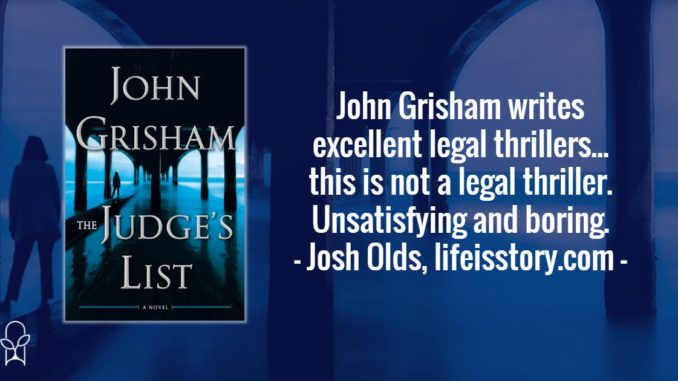
Series: The Whistler #2
Published by Doubleday Books on October 19, 2021
Genres: Fiction, Thriller
Buy on Amazon
Goodreads

In The Whistler, Lacy Stoltz investigated a corrupt judge who was taking millions in bribes from a crime syndicate. She put the criminals away, but only after being attacked and nearly killed. Three years later, and approaching forty, she is tired of her work for the Florida Board on Judicial Conduct and ready for a change.
Then she meets a mysterious woman who is so frightened she uses a number of aliases. Jeri Crosby’s father was murdered twenty years earlier in a case that remains unsolved and that has grown stone cold. But Jeri has a suspect whom she has become obsessed with and has stalked for two decades. Along the way, she has discovered other victims.
Suspicions are easy enough, but proof seems impossible. The man is brilliant, patient, and always one step ahead of law enforcement. He is the most cunning of all serial killers. He knows forensics, police procedure, and most important: he knows the law.
He is a judge, in Florida—under Lacy’s jurisdiction.
He has a list, with the names of his victims and targets, all unsuspecting people unlucky enough to have crossed his path and wronged him in some way. How can Lacy pursue him, without becoming the next name on his list?
These days, John Grisham sells books on the basis of his name rather than the basis of his stories. While his writing is strongest when he sticks with proper legal thrillers, Grisham has the penchant for wanting to expand his horizons…but still try to take the umbrella of “legal thriller” along with him. One of his most blatant attempts at doing so was The Whistler, a novel about lawyers who work for the state investigating judicial malfeasance. This isn’t actually a thing, but it allows Grisham to move into the realm of detective/police thriller while dragging the “legal thriller” descriptor along with him, kicking and screaming.
The Judge’s List returns to Lacy Stoltz and the Florida Board on Judicial Conduct for a second thriller. Except, instead of investigating a judge using his position to provide legal cover for a number of corrupt operations, they are investigating a judge accused of being a serial killer. Well, “investigating” is too strong a term. Half the novel is Lacy explaining why she shouldn’t have jurisdiction over the case, why the person complaining should contact the police or FBI, and in general just having conversation after conversation.
The complaint has come to her because the police won’t listen, the evidence is all circumstantial, and the woman complaining—a legal scholar whose father was the judge’s second victim decades ago—knows they are legally required to investigate. The Judge’s List is fiction, but Grisham’s handling of it all is a bit loose and sloppy. The entire plot hinges on a complete fiction. Why must Lacy take the case her organization is in no way prepared to handle? Because Grisham says so, that’s why. What’s frustrating is that Grisham could easily have written this with a police detective protagonist and the story would be so much smoother. The Judge’s List jumps through hoops in order to cram Lacy Stoltz into a story that she didn’t need to be in.
As for the investigation, there isn’t any. The daughter of one of the victims has already done all the research and the drama relies more on her quest for justice than the actual protagonist doing anything useful. There’s also no mystery. The judge did it. We know he did it because Grisham adds the judge’s point of view partway through the book. The judge is a wealthy, evil mastermind who can hack anything, has a secret lair, and hobnobs with high society.
Even the resolution is unsatisfactory. I won’t spoil it, but I’ll just say that it’s clever but devoid of any sense of drama or excitement. Grisham writes amazing legal thrillers. The rest of his novels range from surprisingly good to absolute garbage. This one, though it has its moments, is closer to garbage. The Judge’s List is a mishmash of interesting premises put together in an unsatisfying and unsatisfactory way.
